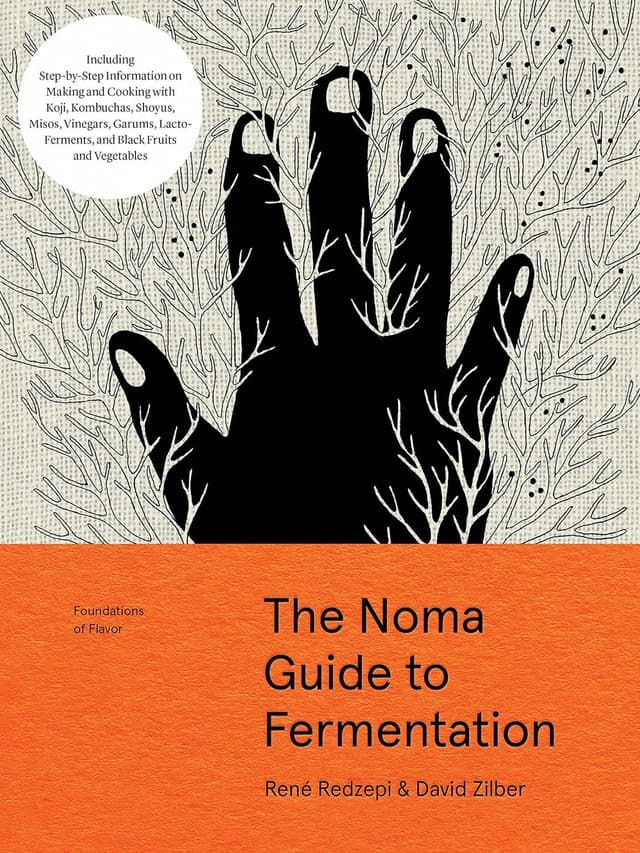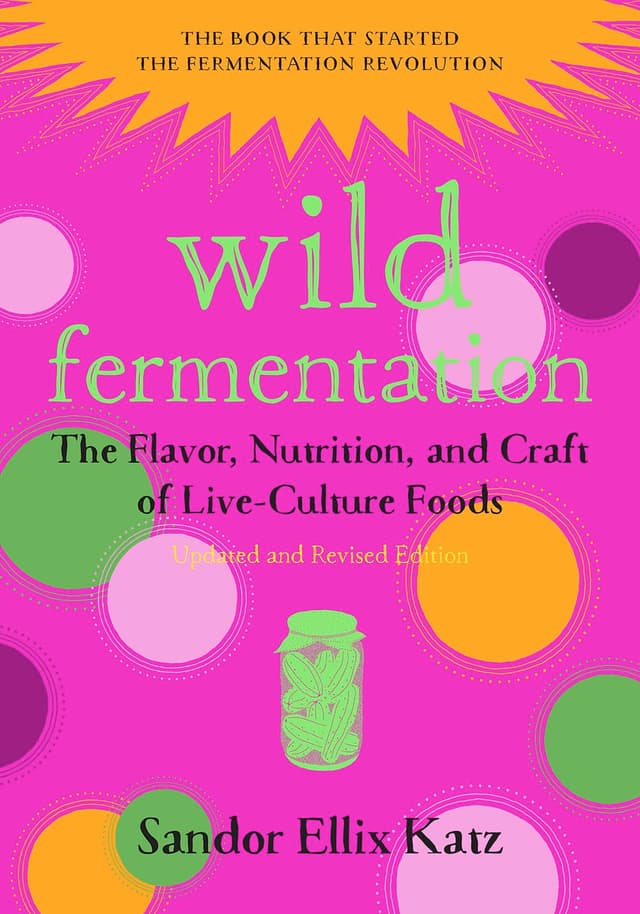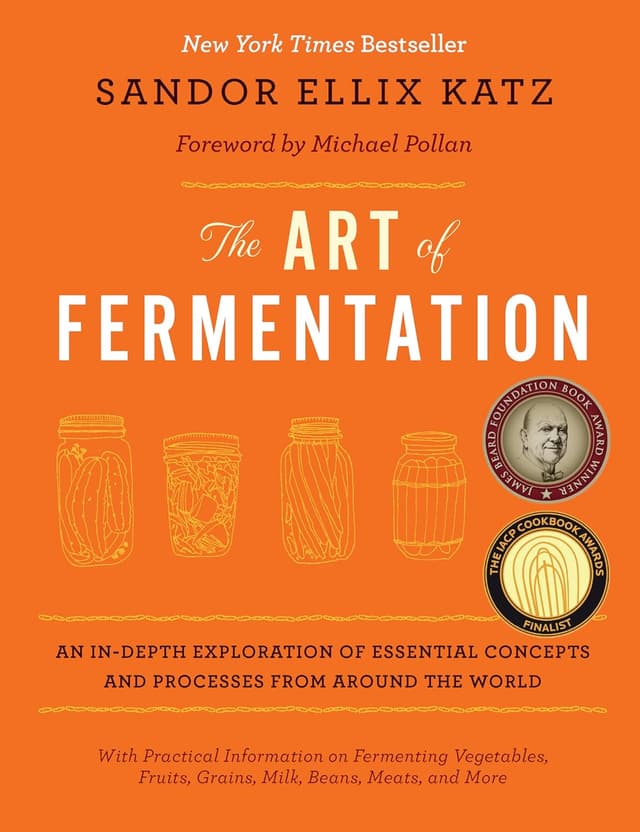Nick Parish | December 7, 2021
The Fermentation Edition
On waste, bacteria, and ecology
Recommended Products

A comprehensive guide to fermentation from the chefs of Noma, a renowned restaurant.

A book by Sandor Ellix Katz, providing insight into the process and benefits of fermentation.

A comprehensive guide to do-it-yourself home fermentation.
Nick Parish (NP) has been a long-standing friend of WITI since his days as the junior reporter on the NY Post’s sports desk. He’s since worked in editorial, strategy, product design and currently lives in Portland. He’s a fly fishing mentor to Noah, and he last talked about fermentation/Kombucha way back in NYC at 2008’s Interesting New York conference, a strange precursor to this very newsletter. - Colin (CJN)
Nick here. I love fermentation. At its core, it’s the story of how the human species has ridden out boom and bust cycles of nature, uncovering tasty treats and useful new materials in the process. It’s a story of magic and alchemy.
My love of fermenting at home started over a decade ago with kombucha in a tiny uptown apartment, glass jars from a Harlem dollar store, and a mother culture gifted from a car service driver.
Now, I’m looking after a big urban garden in Portland, Oregon, with a fair chunk of shed space for experiments. Our overgrown lot features several dozen varieties of edible berries, tree fruits, perennial vegetables, and other items you’d find in the farmer’s market, in addition to a big seasonal vegetable garden and a leech-filled pond. On good days, time spent in the garden is a feast, where we wander and graze on whatever looks ripe. On (rare) bad days it’s me fretting over soil health, pest management, and the future.
I’ve moved from kombucha to beer, wine, kimchi, hot peppers, hot sauce, tobacco, sourdoughs, and even lant (don’t ask). My eccentric digestive experiments are semi-tolerated by my exquisite food writer spouse. She’s constantly trying out new recipes, so I get both contemporary inspiration and raw material.
But one fermentation habit has been transformative above all others and helped me understand the broader implications of our consumption, reframing it in terms of future nourishment.
I ferment my trash.
To be specific, I ferment our compostable kitchen waste through a process known as bokashi.
Layers of our scraps ferment in a sealed five-gallon bucket, together with specially inoculated wheat bran. The inoculant is a product containing a combination of living bacteria, which has an odd enough origin story and following to merit its own WITI.
As each bucket fills (I have three in rotation), it’s sealed for two weeks to ferment, then it’s ready to deploy. I dig it into one of the compacted pathways in my vegetable garden, and it decomposes in a few weeks, adding microorganisms and nutrients back into the system.
Photo by Alex Lau
Why is this interesting?
In the last several years, our environmental and health crisis has shifted personal responsibility from a marker of identity to a safety mechanism.
Whether it’s wearing a mask or planting a garden, we’re all being asked to do more, on our own. There’s a control in self-sufficiency, and that can become resilience, an important cornerstone to empathy and psychological wholeness.
As these crises unfold, we’re given the opportunity to make important changes at a macro, societal level to engage this new responsibility together.
Several years ago I began consulting with a big apparel company’s sustainable-innovation department, which had “waste as material” as a significant strategic pillar. Meanwhile, I was getting into the Expanse series, where off-planet Belters were endlessly resourceful and everything ultimately went into a recycler, a magic gadget trope not unlike the Fremen stillsuits in the Dune universe, or the Federation’s replicators.
One was magic, one was Excel. The crew of the Rocinante’s soy kibble felt very far from pivot tables calculating macerated plastic by the ton. But the gulf between sci-fi and Earth realities-at-scale has never been closer, not from technological possibility as much as existential need.
Soon we’ll be forced to pull out all the stops. Zero-waste environments (in Ljubljana, or in the “recyclers” we’ll need at home) will become a greater part of our consciousness as supply chains continue to break and reform. We’ll need to create soil substrates that are as capable as possible as we trial new varieties of adaptable plants to mitigate the effects of climate change. As you may remember from The Composting Edition, these group efforts often lack broad engagement, and many are now facing temporary setbacks.
Fermentation is a delicious game with many applications that anyone remotely gastronomically inclined can play. All you need to start today are some blueberries, salt, a glass, and a plastic baggie (shouts out to The Noma Edition; I hear he’s making burgers now). No matter its simplicity, in playing along you’re adding yourself—literally, in terms of your household codependent bacteria mix—to a most essential elemental process: energy consumption.
Beat the rush to the next lockdown hobby and grab a kimchi crock and a case of canning jars and the Katz and Noma books. Ferment. Preserve. Repeat. You’ll never look at your food in the same way once you’ve set it free to transform, and you’ll never be more capable to face the challenges ahead. (NP)
[Sponsored links: Atlas Bars are GMO-free and keto-friendly with 15 grams of protein and just a gram of sugar. We’ve tried Atlas and they are very good. Use this link (code WITI20) for WITI readers to get 20 percent off. Get started with the sample pack.]
--
WITI x McKinsey:
An ongoing partnership where we highlight interesting McKinsey research, writing, and data.
Asia's growing global role. You probably don’t need us to tell you that Asia plays a key role in culture and the global economy. But if, say, Squid Game's worldwide success took you by surprise, you might get something out of the latest edition of McKinsey for Kids, which heads to Asia and digs into how the stuff you love—be it your favorite hoodie or binge-worthy TV—gets to you. Explore the interactive for a fun look at big ships, the Silk Road, Bollywood, and more of Asia’s past, present, and future.
--
Thanks for reading,
Noah (NRB) & Colin (CJN) & Nick (NP)
—
Why is this interesting? is a daily email from Noah Brier & Colin Nagy (and friends!) about interesting things. If you’ve enjoyed this edition, please consider forwarding it to a friend. If you’re reading it for the first time, consider subscribing (it’s free!).

